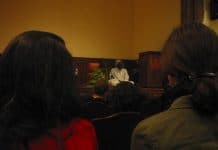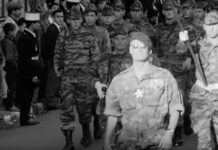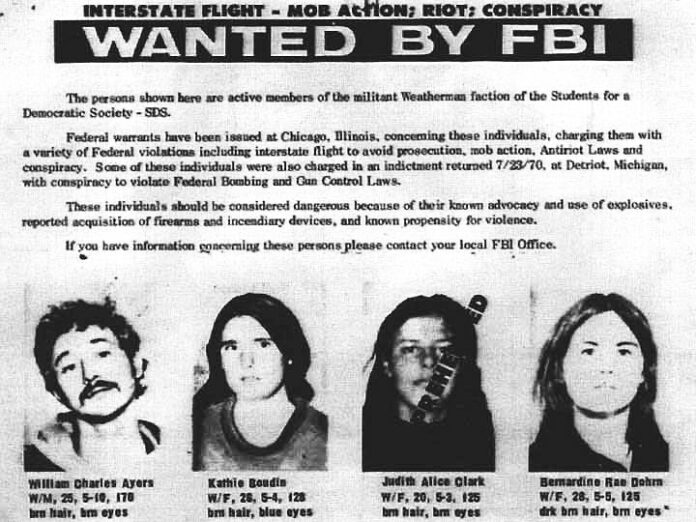

Linkbox om The Weathermen (The Weatherman eller Organization, WUO), som var en revolutionær anti-imperialistisk og venstreradikal undergrundsorganisation, der voksede ud af Vietnam- og studenterbevægelsen i USA i 1969. De gennemførte en række attentater mod statslige og militær-industrielle bygninger.
Socialistisk Bibliotek (påbegyndt 2009).
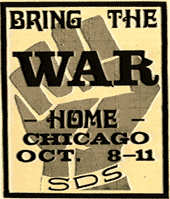
The Weatherman tog navn efter linje i Bob Dylans sang Subterranean Homesick Blues: “You don’t need a weatherman to know which way the wind blows”. Se om sangen (Wikipedia.org) + om Days of Rage (Wikipedia.org).
Om Weathermen og deres historie/ The Weathermen & their history
På dansk:
‘Weather underground’ – Militant modstand i USA. Af Alfred Lang (Autonom Infoservice):
- 1. del: Fra radikale protester til militant modstand (5. august 2013)
“Hvem var ‘Weather Underground’ i virkeligheden? Hvordan opstod de og hvad var deres mål? Her er deres historie.” - 2. del: Weather underground – byguerillaens historie i USA (26. september 2013)
“Da Weather Underground så, at demonstrationer og happenings stadig oftere blev mødt med repression, omfattende kriminalisering og selektive henrettelser, gik mange af deres aktivister i undergrunden for at starte den væbnede kamp.”
In English:

- Weather Underground Organization (Wikipedia.org)
Længere leksikal artikel med mange links. - Weatherman / Weather Underground Organization (SDS). Link til originalt materiale 1969-1970, samt 1975. Desuden link til: “FBI files on the Weather Underground Organization (Weatherman)” (1976, 420 p.)
- You Don’t Need A Weatherman To Know Which Way The Wind Blows (New Left Notes, June 18, 1969; online at Internet Archive)
“The famous manifesto that gave the Weathermen their name; submitted by Karin Asbley, Bill Ayers, Bernardine Dohrn, John Jacobs, Jeff Jones, Gerry Long, Home Machtinger, Jim Mellen, Terry Robbins, Mark Rudd and Steve Tappis.” - Weatherman (pdf). Edited by Harold Jacobs (Ramparts Press 1970, 306 p.; online at Internet Archive)
Indeholder artikler af tidligere medlemmer og kritikere, samt kommunikeer fra organisationen.
What Mother Country Radicals misses about the Weather Underground. By Daniel S. Chard (Jacobin, August 23, 2022)
“A new podcast examines the life and times of the Weather Underground and several of its members. It’s a moving story. But an assessment of the New Left’s turn toward political violence, rooted in political weakness rather than strength, is missing.”
Mark Rudd’s lessons from SDS and the Weather Underground for today’s radicals (Jacobin, March 29, 2021)
“Mark Rudd was Columbia’s Students for a Democratic Society chapter president in 1968, when the university erupted in protest against the Vietnam War and racism. He then cofounded the Weather Underground. In an interview with Jacobin, he reflects on what radicals like him got right and got wrong, and what today’s socialists should learn from his experiences.”
NY Times, Mark Rudd on anniversary of Columbia U sit-in: Socialist revolution is a “fantasy”. By Patrick Martin (World Socialist Web Site, 26 April 2018)
“Mark Rudd, the most prominent leader of the student protests at Columbia University in April 1968, one the seminal events of the 1960s radicalization in the United States, has written a thoroughly dishonest and politically reactionary commentary on that experience in an op-ed column published Monday by the New York Times.”
Reflections of a Weather Underground veteran. By Kim Moody (New Socialist, August 25, 2012; online at PM Press). Review of David Gilbert, Love and Struggle: My Life in SDS, The Weather Underground, and Beyond (PM Press, 2012)
“The path I took Gilbert derisively dismissed as the traditional Old Left path that sees the working class as the central agent of change. The path he took we derisively dismissed as ‘Third Worldism’. Before looking in more depth at the theory and practice involved, it is worth summarizing Gilbert’s development as he describes it.”
MarkRudd – Yes its the Mark Rud from the sixties (Markrudd.com)
Har skrevet bogen: Underground: My life with SDS and the Weathermen (HarperCollins, 2009, 352 p.). Indeholder flere artikler om erfaringerne fra undergrunden. SDS, vold og ikke-vold, anti-imperialisme og organisering dengang og i dag. See the book online at LibCom.
Pacifism and the military-industrial-university complex: Interviewing Mark Rudd. By Bob Feldman (Toward Freedom, 7 April 2009)
“In a recent email interview with Toward Freedom, Rudd responded to some questions about how U.S. pacifists might consider responding to the role U.S. universities play in the current historical era of ‘permanent war abroad and economic depression at home’ and about his new book.”
A climate of violence: The Weather Underground & The FBI, 1968-78. By William Shatner (Undergraduate Thesis at Oxford University, 2008; online at Scribd.com)
“Investigates the relationship between dissident movements and the police apparatus of the American state with specific reference to the Weather Underground and the FBI between 1968 and 1978: The Weathermen need to be rehabilitated into contemporary discussions of the sixties, as their experience is emblematic of the New Left’s awkward flirtation with violence and the morality of prioritising political objectives over human life.”
In defense of Bill Ayers. By David Walsh (World Socialist Web Site, 17 October 2008)
“Republican presidential candidate Sen. John McCain and his supporters are continuing to pursue their smear campaign against former Weatherman radical Bill Ayers, now a professor at the University of Illinois at Chicago.”
A slander against the ’60s. By Elizabeth Schulte (Socialist Worker, US, October 13, 2008)
“Elizabeth Schulte exposes the Republicans’ lies about the struggles of the 1960s as John McCain’s presidential campaign reaches a new low.”
A deeper look underground. By Scott Johnson (International Socialist Review, Issue 61, September-October 2008). Review of Dan Berger’s book, Outlaws of America (AK Press, 2008)
“It is to Berger’s credit that a decent understanding of these issues can be gained from reading his book. But in spite of the wealth of information he provides, one must often read between the uncritical lines of his text to understand the underlying dynamics of the Weather Underground.” Se også Dan Berger: The Weather Underground and the American radical legacy (Toward Freedom, 29 August 2006)
Weather Reports. By Maurice Isserman (The Nation, January 24, 2008)
“The radical individualism of the New Left was hardly un-American: A batch of new memoirs show the Weatherman followed a distinctly American tradition.”
Weather Underground rises from the ashes: they’re baack! By Jesse Lemisch (New Politics, Issue 41, Summer 2006)
“Veterans of Weather (as well as some fans) seem to be on a drive to rehabilitate, cleanse, and perhaps revive it – not necessarily as a new organization, but rather as an ideological component of present and future movements. There have been signs of such a sanitization and romanticization for some time.”
Left-wing terrorism? By Phil Shannon (Green Left Weekly, Issue 629, 8 June 2005). Review of Jeremy Varon’s book, Bringing the War Home (2004)
“Jeremy Varon’s descriptively vivid and analytically rich book explores the motivations and failings of the young women and men of Weatherman and RAF.”
Planting Seeds in poisoned soil a history of Weather Underground. By member of Resist and Exist (2005)
Artikel om Weather Underground med liste over aktioner og litteraturliste. Skrevet af medlem af det anarkistiske punkband Resist and Exist (1990-).
The Weather Underground’s Prairie Fire statement…thirty years on. By Ron Jacobs (CounterPunch, July 24, 2004)
“In 1974 the Weather Underground decided to remain underground and operate as it had since 1971, occasionally bombing selected symbolic targets and propagandizing around those actions. This was the context in which they released Prairie Fire – The Politics of Revolutionary Anti-Imperialism.”
Interview with Sam Green. By David Walsh (World Socialist Web Site, 7 May 2004)
“David Walsh spoke to Sam Green, co-director of the documentary on the Weather Underground, the US radical terrorist group in the 1970s, at the Buenos Aires film festival.”
Which way the wind blew: Rise and fall of the Weather Underground. By Brian Jones (Socialist Worker, US, Issue 457, June 13, 2003). Review of the documentary The Weather Underground: ’60’s Radicals Revisit a Tumultuous Era, directed by Sam Green and Bill Siegel.
“The Weather Underground is a fascinating documentary that retraces the rise and fall of the Weathermen, a revolutionary terrorist group founded in the late 1960s that ultimately never developed anything close to a viable strategy for revolution.”
Antiwar movements, then and now. By Benjamin H. Shepard (Monthly Review, Vol.53, No.9, February 2002). Review of Bill Ayers, Fugitive Days: A Memoir (Beacon Press, 2001, 292 p.)
“Weather Underground veteran Bill Ayers’ memoir bears light on a dark, often misunderstood, crucial point within U.S. political history.”
The Way the Wind Blew: A history of The Weather Underground. By Ron Jacobs (Verso, 1997, 114 p.; online at Libcom)
“In the first comprehensive history of the Weathermen, Ron Jacobs narrates the origins, development and ultimate demise of the organization: its emergence from the Students for a Democratic Society; its role in the famous Days of Rage in Chicago during October 1969; its decision to go underground; the various actions it staged and in some cases bungled during the 1970s; its role as goad to other left organizations to sustain the struggle against racism and imperialism; and finally its disintegration.”
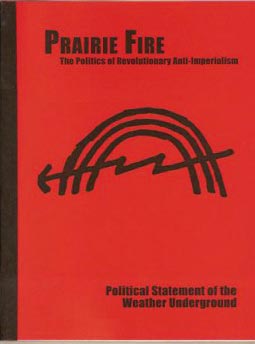
Praire Fire: The Politics of Revolutionary Anti-imperialism (pdf) (Communications Co., 1974, ca. 190 p.)
“The political statement of Weather Underground”. Erfaringer fra 5 års undergrundsaktiviteter.
Debate within SDS. RYM II vs. Weatherman (Marxists Internet Archive). See here Noel Ignatin [i.e. Noel Ignatiev]: “Without a science of navigation we cannot sail in stormy seas.”
“The Weather Underground” (YouTube.com, 2003, 1:30:25 hour). Documentary directed and produced by Sam Green, Bill Siegel and Carrie Lozano.
Se også på Youtube dokumentarer om Weather Underground.
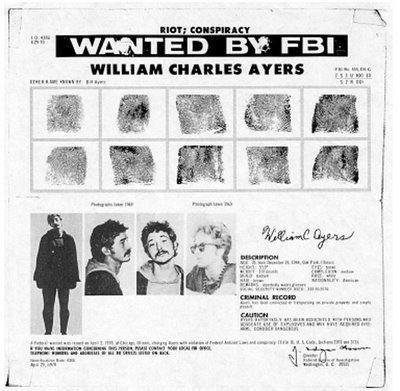
Se også:
The Weathermen (hip hop group) (Wikepdia.org)
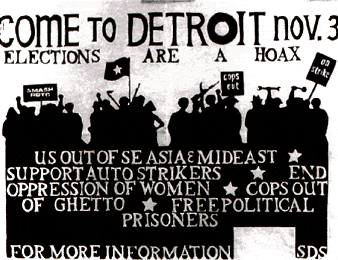
Turning to the working class: An interview with Kim Moody (Jacobin, 8 July 2018). “Here, Moody speaks with Chris Maisano about his time in SDS, the possibilities and limitations of community organizing, and why radicals should prioritize working within the labor movement.”
1968: SDS and the revolt of the campuses. By Geoff Bailey (SocialistWorker.org, July 3, 2018). “The tragedy is that the form of revolutionary politics ultimately adopted within SDS was itself incapable of providing a way forward.”
Half the way with Mao Zedong. By Paul Heideman (Jacobin, May 23, 2018). “How Students for a Democratic Society went from building a mass movement to embracing the politics of self-destruction.”
The rise and fall of SDS: The making of a new left (International Socialist Review, Issue 31, September–October 2003). “Geoff Bailey looks at the role of Students for a Democratic Society in the mass radicalization of the 1960s.”
Linkbox: Marxism and terrorism (Socialistisk Bibliotek). Artikler om marxisters holdning til terror og terrorisme.

















